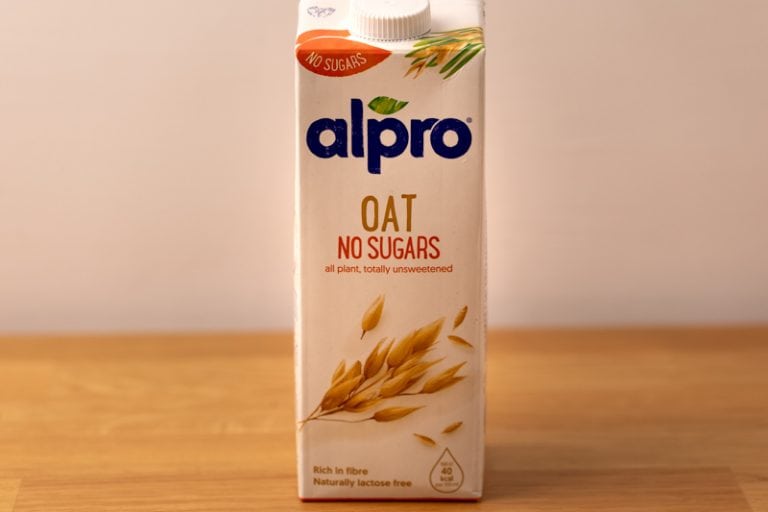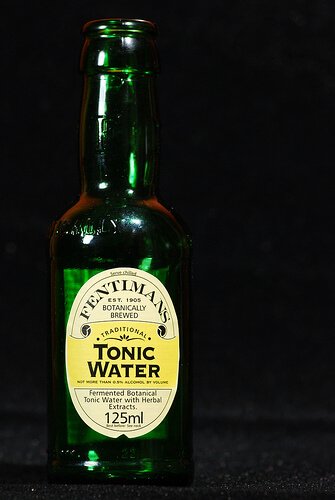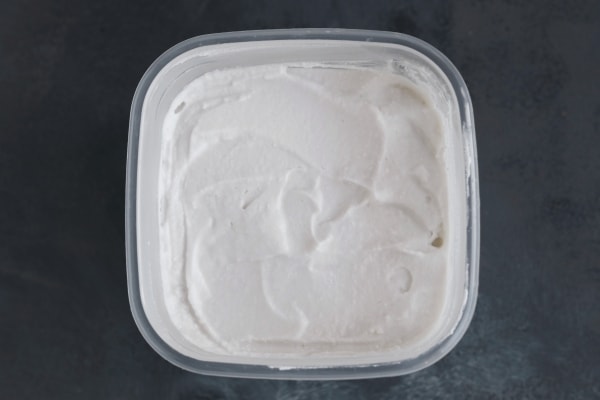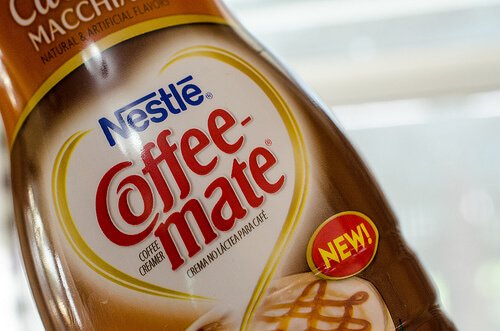How Long Does Coconut Milk Last?
Here’s all you need to know about storage, shelf life, and spoilage of coconut milk. In it, you will learn when you need to refrigerate it and how to tell if it’s bad.
You’ve bought coconut milk for the first time, opened the carton or bottle, and are wondering how long it lasts.
Or maybe yours has sat in storage for a few days already, and you want to check if it’s still okay to use or not. The issue is that you’re not sure what to look for.
Sound familiar? If so, you’ll find this primer on coconut milk quite useful.
To start things off, let’s talk about carton coconut milk and canned coconut milk and the differences between these types. Because even though both are called “coconut milk,” they are quite different and rarely interchangeable.
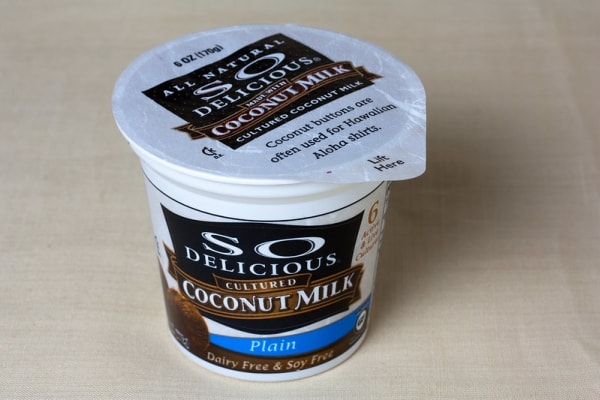
Carton Coconut Milk vs. Canned Coconut Milk
Coconut milk is the liquid that’s extracted from coconut meat.
Now, that liquid can be turned into canned coconut milk, the one that we usually use when cooking soups and curries, or coconut milk drink, a dairy-free milk alternative we drink or use in smoothies.
The main differences between the two are the amount of water added and the presence of stabilizers.
Canned coconut milk typically has a short 2 – 3 ingredients list (coconut, water, guar gum) and has much less water than its counterpart. And if the can sits at a cool temperature for long enough, the solids separate from the liquid, and you’re left with a layer of coconut cream on top when you open the can.
Carton coconut milk, on the other hand, contains much more water and typically some stabilizers. These ensure the fat doesn’t separate from the liquid and that the drink is nice and smooth when you open it after months of storage.
Coconut water is the water that’s inside a young coconut. It’s not a thinned-down version of coconut milk.
Refrigerated vs. Shelf-Stable Carton Coconut Milk
Usually, carton coconut milk is shelf-stable, meaning that it doesn’t require refrigeration until you first open it. But you might find in your grocery store refrigerated coconut milk, available in bottles or cartons and stored in the fridges.
Both shelf-stable and refrigerated varieties are identical in terms of ingredients, and the thing that makes the former not require refrigeration is its aseptic packaging.
(The same is true for regular milk and other dairy-free alternatives such as oat milk, soy milk, and rice milk.)
Now that we covered all various types of coconut milk available, let’s get to storage, shelf life, and signs of spoilage.
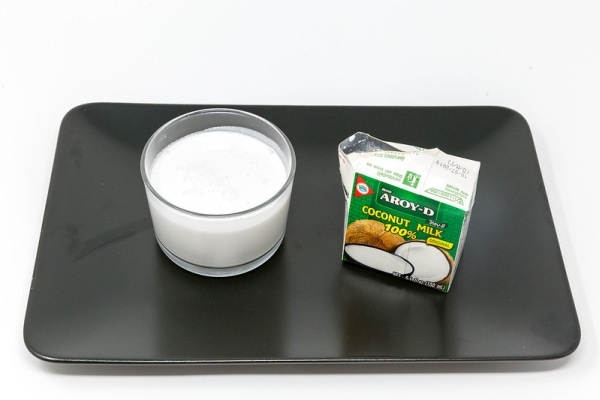
Does Coconut Milk Need to Be Refrigerated?
Both canned and carton coconut milk can sit at room temperature until you open it up. After opening, transfer the leftovers to the fridge in a sealed container, where they can sit for 5 to 10 days.
The only exception to the rule is refrigerated coconut milk, which needs to sit in the fridge at all times.
Now, what if you accidentally left out a half-open container of coconut milk?
How Long Can Coconut Milk Sit Out?
The official USDA recommendation is that perishable products (which opened coconut milk certainly is) should be discarded if they sit out on the counter for more than two hours.
That rule might seem a bit strict, and it’s obvious that in many cases, your half-open coconut milk will still be fine after those two hours. The issue is that you never really know, and it’s better to err on the side of caution in this matter.
But if you ever bend or break this rule, be smart about it. For example, if that carton sat on the kitchen counter for the whole day (or you left it out overnight), the odds aren’t in your favor. So toss it and open a new one.
(The same applies to almond milk, which I discuss in the section on how long can almond milk sit out in the linked article.)
Other Storage Practices
Here’s what you should remember about storing coconut milk:
- Keep the leftovers sealed and refrigerated. If it’s canned coconut milk, pour the rest in an airtight container before transferring it to the fridge.
- Shake carton coconut milk before using.
- If it’s open for more than a day, always pour it in a glass instead of using it straight from the carton. This way, you can easily assess the quality and check if it’s okay to use.
I’m pretty sure you already follow most of these, but everyone could use a reminder every now and then.
How Long Does Coconut Milk Last?
Both carton and canned coconut milk have a shelf life of 12+ months and easily keep for a few months past the printed date. Once you open the carton or can, you should finish the nut milk within 5 to 10 days.
As usual, refrigerated coconut milk is the exception to these rules.
It keeps for only a couple of weeks, and you shouldn’t expect it to last for more than a week past its date. After opening, it keeps quality for about 5 to 10 days, depending on the brand’s recommendation.
| Pantry | Fridge | |
|---|---|---|
| Unrefrigerated carton unopened | Best-by + 3 – 6 months | |
| Unrefrigerated carton open | 5 – 10 days | |
| Refrigerated carton unopened | Use-by + 3 – 7 days | |
| Refrigerated carton open | 5 – 10 days | |
| Canned unopened | Best-by + 6 – 12 months | |
| Canned open | 5 – 10 days | |
| Homemade | 3 – 4 days |
If you’re using coconut milk as a coffee whitener of choice, choose the carton drink variety. And if you’re into steaming and frothing, look for the barista blend that’s better suited for those purposes.
Expired Coconut Milk
Both cans and shelf-stable cartons of coconut milk have quite a long shelf life, and they should stay safe to use for months past the date on the label.
While it’s impossible to say exactly how long past its date coconut milk will be okay to use, I’d assume that cans keep longer than aseptic UHT cartons. Think years versus months after the date.
(It also depends on what you’re comfortable using. For example, if your can is a month past the printed date and you’re not comfortable opening it and checking its quality, toss it.)
Once again, things are a bit different for refrigerated coconut milk drink. Since its shelf life is quite limited, I wouldn’t expect it to retain quality for more than a week past its date. If it’s longer than that, it’s probably best to discard it no matter what.
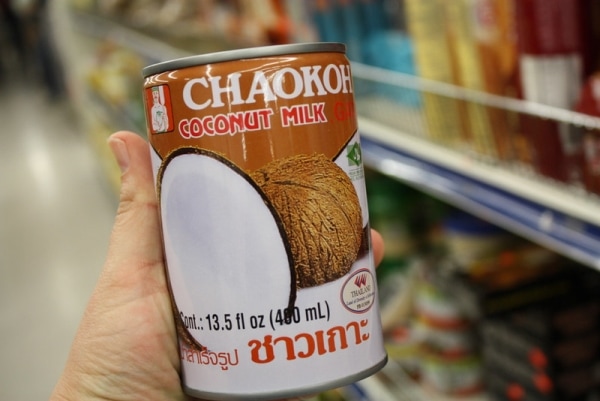
Opened Coconut Milk
After opening, coconut milk lasts 5 to 10 days, no matter if it’s canned coconut milk or its carton counterpart.
Of course, a couple of days of storage will change the quality of the product.
Canned coconut milk will separate in the fridge after a day or so. The product stays safe to use, and you can always warm it up and stir if you need it liquid.
On the other hand, carton coconut milk might separate a bit after a couple of days, depending on the number of additives and stabilizers added. If there aren’t any, you might see some floating white particles of coconut fat on the surface, and that’s okay.
If you need to store the product for a prolonged period after opening, consider freezing your leftover coconut milk. Both varieties freeze differently and work well in specific scenarios (e.g., cooking and baking), so it’s best to read up on the topic a bit before actually freezing the product.
For coconut milk drinks, write the day you first open the carton on its label. This way, you can easily track how long it’s opened.
Last, canned coconut milk should look quite alright in the fridge even after two weeks or more of opening. There will be a thick layer of white coconut fat on the surface, and everything will look and smell just fine, assuming you don’t accidentally introduce any microbes to it.
Even if that’s the case, discard the product anyway.
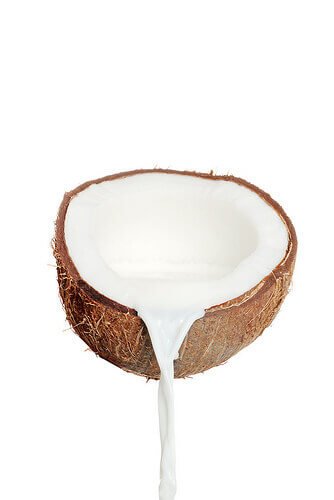
How to Tell if Coconut Milk Is Bad?
When checking if your coconut milk is safe to use, do what follows:
- Check the dates. If it’s still unopened, make sure it’s not way past its date, depending on the variety. Otherwise, ensure it doesn’t sit in the fridge longer than the mentioned 5 to 10 days.
- Give it a good whiff. If the carton variety smells sour or moldy, it’s done for. For canned coconut milk, check if it smells rancid (sour, harsh, chemicals-like).
- Shake it if it’s the carton drink variety and pour it in a glass.
- Visual check. Look for changes in color and consistency. If your coconut milk drink is super lumpy (small white particles are okay for some brands) or heavily separated, it’s done for. Same thing for discoloration or any other odd changes. For canned coconut milk, check if there’s any mold on the surface. Again, separation is expected (even if it’s unopened and stored at room temperature), and nothing to be concerned about.
- The taste test. If it’s a coconut milk drink, I’m pretty sure you can tell if yours tastes okay or not. Just note that various brands taste differently, and the texture isn’t quite the same either. For canned coconut milk, it should taste coconut-y and definitely not rancid.
As usual, the list above isn’t complete by any means. If you notice anything else that seems off or iffy, throw out the product. Better safe than sorry.
Rotten Records: Share Your Snap!
Caught some food past its prime? Upload your photo to “Rotten Records” and help others spot the signs of spoilage. Every image makes our food community safer and more informed!
